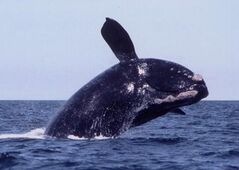 The extinction of whales, birds, and other creatures that once praised God God called all of them good. Humans are rapidly destroying them. May 20, 2019 - Christian Century, Jun 5, 2019 issue A whale that washed up on a beach in the Philippines recently was found to have 88 pounds of plastic in its stomach. That event encapsulates a planetary crisis: the earth’s magnificent creatures—including the very Leviathan that God enjoys watching “sport” in the sea (Ps. 104:28)—are being destroyed by human recklessness. This destruction is happening faster than scientists had previously imagined. A panel of international experts reported in May that up to 1 million of the world’s species are in danger of becoming extinct in the next half century—some within the next two decades. That amounts to one in every eight animal or plant species on the earth. Although species extinction is always happening because of natural changes in habitat, what’s new, according to experts from 50 countries (who belong to the Intergovernmental Science-Policy Platform on Biodiversity and Ecosystem Services), is the rate of extinction—it’s tens to hundreds of times faster than normal. As wetlands are drained, forests are cleared, water is polluted, and oceans are overfished, animal and plant habitats shrink. Climate change puts additional stress on species, making it even harder for plants and animals to adapt. Biodiversity is in rapid decline. The loss of entire species of insects, amphibians, fish, birds, and wildlife and the habitats they depend on will inevitably make human life more precarious. For example, a less biodiverse world with fewer species of crops will mean crops are less resilient. It will be harder to feed the human population. “Protecting the invaluable contributions of nature to people will be the defining challenge for decades to come,” said British scientist Robert Watson, chair of the international panel. Watson and colleagues appeal to people’s enlightened self-interest to motivate a response to the crisis. They want people to recognize the invaluable contribution that the diversity of creation makes to human life. But this instrumental view of nature is itself at the heart of the crisis. It stands in contrast with the vision of creation found in the Bible, where the diversity of plants and animals is not simply useful for humans; it is good in itself, a feature of creation that commands respect and wonder. The divine response to the unfolding of species, as recorded in Genesis 1, is affirmation: “And God saw that it was good.” According to the psalm writers, the proper response to the diversity of creation is praise: “O Lord, how manifold are your works! In wisdom you have made them all” (Ps. 104:24). Psalm 148 imagines the creatures themselves praising God, each in their own way, through their mode of existence: “Sea monsters . . . wild animals and all cattle, creeping things and flying birds! . . . Let them praise the Lord.” Humanity’s assault on the diversity of species is more than self-destructive. It is a denial of creation’s intrinsic worth and of humanity’s fundamental vocation of wonder and praise. A version of this article appears in the print edition under the title “Biodiverse praise.” Comments are closed.
|
Archives
January 2021
|

 RSS Feed
RSS Feed
